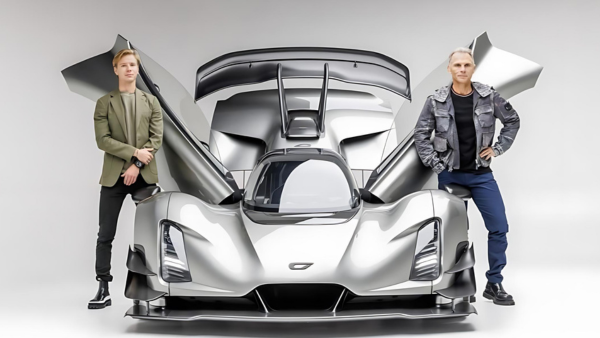Last Thursday, I had the opportunity to visit Divergent Technologies in Los Angeles. It is a remarkable manufacturing company that is a gigantic leap over current systems.
Divergent will likely make virtually all current manufacturing obsolete. Kevin Czinger founded Divergent in 2014. Today, he is the company’s executive chairman while his son Lukas Czinger is the President and CEO. The company has 750 patents on advanced manufacturing systems.
The beating heart of the Divergent system is the integration of artificial intelligence, 3D printing, sophisticated material science, and a robotic system for manufacturing and assembling.
Divergent’s Adaptive Production System (DAPS) can design, modify, redesign, print, and assemble various products at lightning speed.
Its remarkable results have been validated by outside customers.
General Atomics, which makes the Predator drone and a host of other defense applications (including nuclear fission and fusion research), hired Divergent to redesign a cruise missile. According to General Atomics’s own analysis, Divergent produced a 98 percent reduction in parts, a 90 percent reduction in cycle time, a 40 percent reduction in variable costs, and a 50 percent reduction in development cost.
It reduced the number of parts in one product from 184 to four. The artificial intelligence component continually redesigned the product in real-time to get a more compact system. It then sent a new design over to digitized production that used 3D printing and robotics. The result was a 98 percent reduction in parts.
This process also reduced weight by 5 percent, which then allowed the defense product to be faster and able to fly longer. Divergent’s system dropped production time from 12 days to one – and accelerated development from 18 months to four months.
The Divergent model may be the key breakthrough in solving the Defense Department’s two great challenges.
The first challenge is figuring out how to leapfrog China and remain the most powerful modern military in the world. The second challenge is how to reduce costs in the wasteful bureaucratic system we have grown over the last 80 years.
My personal experience in the factory was amazing. Divergent’s system is incredibly precise and remarkably quick. When you watch them make parts for super cars such as Bugatti, Ferrari, and McLaren, it’s clear how good they are.
When the big American automotive companies turned down the opportunity to work with Divergent, Kevin Czinger decided to prove the system’s capabilities. He manufactured the Czinger 21C super car. The vehicle is now the fastest production car in the world. It makes 1,250 horsepower, can reach 219 miles per hour, and can be driven on regular roads. It costs $2.8 million, and they sell quickly.
When I visited the automotive factory, I was stunned by the efficiency, calmness, and productivity. You could emotionally feel the confidence workers have in their system.
Further, Kevin Czinger is an amazing American. He has been a Marine rifleman, a Yale educated lawyer, and a Wall Street investor. Yet, the most amazing indicator of his intensity and competitiveness may be his record at Yale in football, which earned him recognition from the National Football Foundation’s Hall of Fame.
Divergent has created a system which is a generation ahead of anything China has developed. In many ways, Divergent is to manufacturing what SpaceX has been to aerospace.
Divergent’s effectiveness could seriously help break the Defense Department bureaucracy’s incestuous ties to slow, incompetent, self-protecting corporations. The Air Force asked Divergent to build parts for the first-generation C-130 (which was first designed in 1951). Original repair parts no longer exist.
It took Divergent 72 hours to turn 2D drawings into physical, useable C-130 tail rudder bell ranks. Naturally, the Air Force bureaucracy then squandered the advantage of Divergent’s speed by spending seven months on airworthiness validation.
All the airworthiness data already existed, and an Air Force artificial intelligence validator could have verified the production process in seconds. Yet, it took seven months.
This is an example of the intense resistance Defense Secretary Pete Hegseth will encounter trying to save time and money in the defense system. The bureaucratic systems – that move at the pace of the slowest bureaucrat – will lead us to destruction if change isn’t made now.
Today, there is one Divergent factory. In the next four years, there should be at least 100 Divergent factories around the United States.
With that scale of real-time manufacturing, the United States will far surpass China. We will develop new systems faster, cheaper, and with greater adaptability.
This should be a major goal for President Trump and Secretary Hegseth. We can make America safe again by being smarter, more productive, more inventive, and more adaptable than any other country on Earth.
It can be done. Visit Divergent and see it with your own eyes. The factory of the future is here.
For more commentary from Newt Gingrich, visit Gingrich360.com. Also, subscribe to the Newt’s World podcast.






